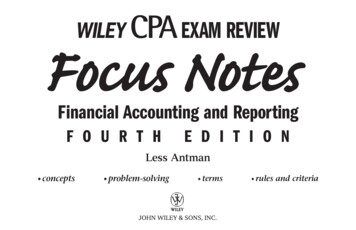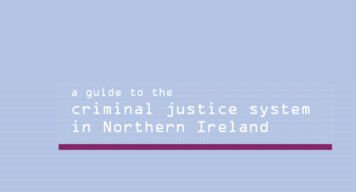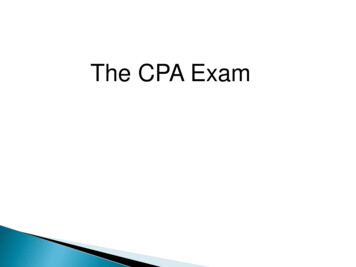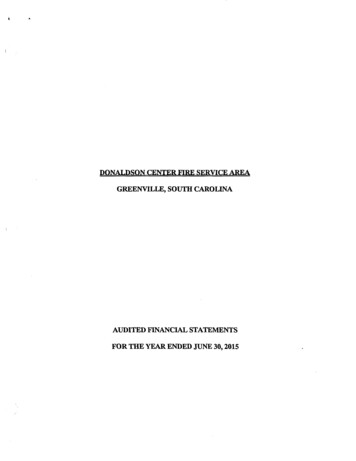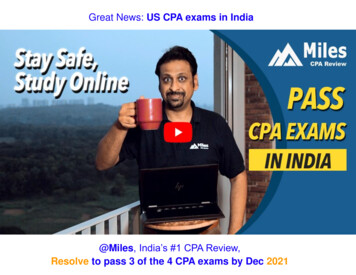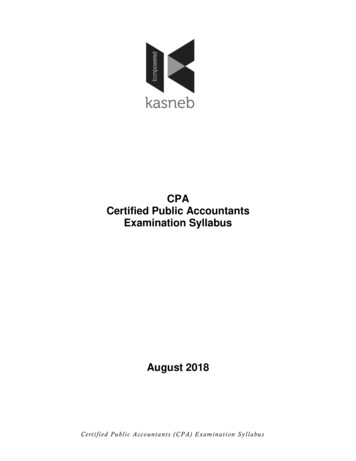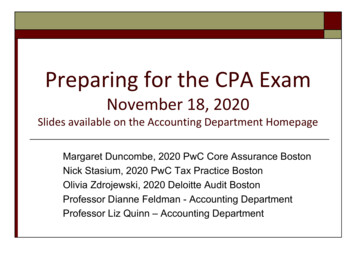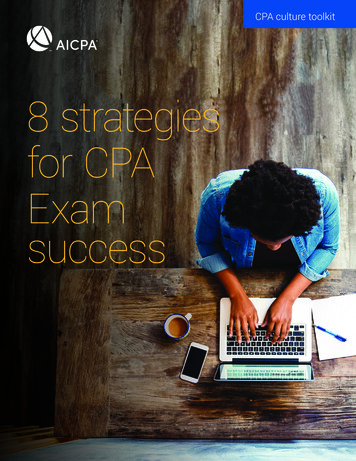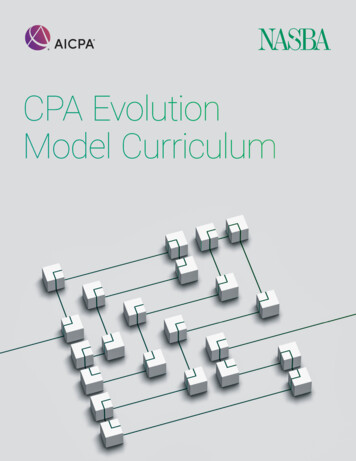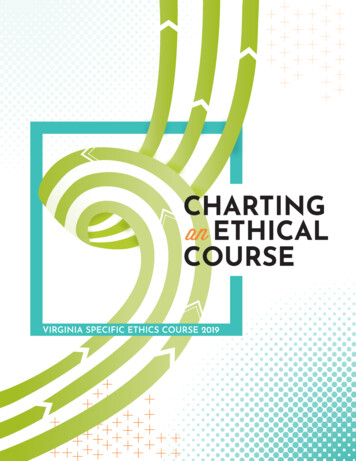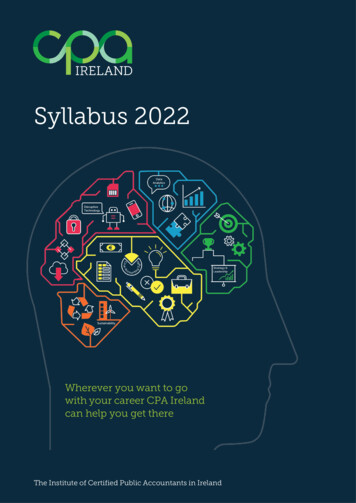
Transcription
Syllabus 2022DataAnalyticsrkDisruptiveTechnologyuStrategy &LeadershipSustainabilityWherever you want to gowith your career CPA Irelandcan help you get thereThe Institute of Certified Public Accountants in Ireland
CPA Syllabus 2022ContentsCPA Ireland Syllabus 2022 Introduction . 3The Examinations System . 4LEVEL: CPA FOUNDATIONFinancial Accounting . 10Management Accounting . 14Taxation . 18Management Fundamentals . 23LEVEL: CPA PROFESSIONALFinancial Reporting . 28Performance Management. 33Advanced Taxation . 38Corporate Law . 43Audit & Assurance . 48Managerial Finance . 55LEVEL: CPA STRATEGICAdvanced Financial Reporting . 62Strategy & Leadership . 66Advanced Tax Strategy . 72Advanced Audit & Assurance . 78Data Analaytics for Finance . 84Strategic Corporate Finance . 89Examinable Material Document. 942
CPA Syllabus 2022IntroductionWe are excited to present the new CPA Ireland new syllabus for 2021, which hasbeen developed in the context of the finance function of the future. We undertookvast amounts of research both desk based, consultative and most recently throughparticipation and representation on the IFAC International Forum for AccountancyEducation Directors. We consulted with many stakeholders including academia,industry, peer profession and global education forums.The key attribute the marketplace now seeks in a professional accountant is theability to influence business at a strategic level and to apply the latest technologicaldevelopments in the business environment. This syllabus has been revised to addressthe impact of emerging and disruptive technologies through the introduction of thesetopics across various subjects on the syllabus and through the introduction of a newelective at our final level – Data Analytics for Finance.CPA Ireland are very proud to announce that we are introducing Sustainability Reportingon both of our final level compulsory subjects, Advanced Financial Reporting andStrategy and Leadership. It is our ambition that our students will be pioneers in thedrive to increase sustainability reporting among corporates.In recognition of the diverse range of rewarding and exciting career opportunitiesavailable to professional accountants, this syllabus provides students with options inthe final level of studies, to tailor the CPA Ireland qualification to their chosen careerpaths. Selecting from a number of pre-qualification specialisms, those students whointend working in public practice can specialise in areas such as auditing and tax whilethose with a preference for industry focus on data analytics and corporate finance.This competency based syllabus positions newly qualified Certified Public Accountants(CPAs) as team players with all the essential technical skills and capacity to operateat a strategic level, capable of understanding and contributing towards every facet ofbusiness including entrepreneurial activity, practice and public service. The CPA Irelandsyllabus balances an appropriate emphasis on strategy, ethics and governance with thefundamental components of auditing, taxation, finance and performance reporting.The CPA Ireland syllabus, a rigorous training process and a commitment to life-longlearning are all designed to ensure that CPAs will retain and enhance their valuedposition in the market place and continue to contribute to the development of business,society at large and the accountancy profession both nationally and internationally.Thank you for your interest in this syllabus. Should you require any further information,the Institute shall be pleased to assist you.Deirdre McDonnellCPA Director; Education & Training,CPA Ireland3
CPA Syllabus 2022The CPA Ireland Examination SystemIntegration with the Training ProcessThe path towards aCPA Ireland QualificationThe integration and interdependence of learning acrosssubjects is explicitly highlighted within the syllabus. Foreach subject the aim, integration with other subjects,indicative syllabus and detailed learning guides areprovided.The CPA Ireland qualification is competency-based.Competency-based education requires candidates toperform tasks and roles to standards expected in theworkplace. Both this syllabus of examination and theCPA Ireland education and training programme areunderpinned by the CPA Ireland Competency Profile,which has resulted from the Institute’s research intowhat will make accountants effective at strategic levelin business and in practice into the future. The Profilespecifies two dimensions: the range of knowledge/skillsneeded by CPAs and the depth of expertise required.It also defines the personal attributes essential for thedelivery of professional services to the highest standards.The Competency Profile for Newly Qualified Accountantsdetails the competencies required of an entry levelCertified Public Accountant. Many of the competenciesrequired of an entry-level accountant are assessedthrough the examination process. Other competencies,by their nature, may be evaluated only in the work placethrough a supervised training regime. These may includenon-technical competencies such as team working,leadership, effective communication skills and problemsolving capabilities.Prior to qualification, these knowledge, skills andattributes are acquired by CPA Ireland students througha syllabus of examinations and a defined training regime.Post-qualification, further development occurs througha mandatory Continuing Professional Development(CPD) programme and exposure to more complex worksituations.The development of professional values, ethics andattitudes is an intrinsic and visible part of the educationand training processes.RecognitionThis approach is of increased relevance because in theevolving business environment there are ever moredemanding expectations of what is required from aprofessional accountant. These arise, in part, fromthe rapidly changing business landscape, businessinnovation, advances in technology, greater exposure toethical challenges, complex regulation, increased volumeand complexity of standards, globalisation, commitmentto lifelong learning, and more diverse education andlearning opportunities.This syllabus complies with the examination requirementsof the European Union governing the approval of personsresponsible for carrying out the statutory audits ofaccounting documents. The CPA Ireland qualification isalso included in the Mutual Recognition Directive, givingCPAs access to the profession in other EU memberstates subject to an aptitude test in local law, taxationand language. CPA Ireland is a founding member of theInternational Federation of Accountants (IFAC) and theCPA Ireland syllabus supports the educational Standards& Guidelines issued by IFAC.All Certified Public Accountants, regardless of whenqualified, will be distinguishable by their ethical values,professionalism and ability to work effectively with people.Such behavioural attributes fall into three categories:1. Professionalism and Personal ethical Standards(covering the areas of values and objectivity).2. Sensitivity to Business Needs (covering how CPAsview and interact with the business environment).3. Interpersonal effectiveness (covering how CPAs workwith others to add value).The Institute also has mutual recognition agreements withCPA Australia, the Institute of Chartered Accountants India,CPA Canada, the Association of National Accountants ofNigeria (ANAN), the South African institute of ProfessionalAccountants, the Institute of Chartered Accountantsof Sri Lanka and the Institute of Cost and ManagementAccountants of Pakistan (ICMA Pakistan).CPA Ireland has also signed memorandums ofunderstanding with CIMA, CPA Sri Lanka, CPA Russia, CPABulgaria, CPA Belarus the Lithuanian Chamber of Auditorsand the Arab Institute of Certified Public Accountants Iraq(ARICPA Iraq).In summary, the effectiveness of Certified PublicAccountants is achieved through the integration ofa robust education and examination process with arigorous, supervised training programme.4
CPA Syllabus 2022Electives (Strategic Level)CPA Ireland is also a Prescribed Accounting Body (PAB)and a Recognised Accountancy Body RAB) under thesupervisory remit of the Irish Auditing & AccountingSupervisory Authority (IAASA).CPA Ireland students at Strategic Level can tailor thequalification to their chosen career path. In addition totwo mandatory subjects shown in Figure 1, AdvancedFinancial Reporting and Strategy & Leadership, theychoose two from four elective subjects. Students notintending to qualify for a practising certificate may chooseto sit and pass any two of the four elective subjects.CPA Ireland is also statutorily recognised as an approvedbody of auditors in New Zealand.Assessment MethodsAll students intending to apply for a Practising Certificateafter qualification must sit and pass the Advanced TaxStrategy subject and any one of the other three electivessubjects. All students wishing apply for a PractisingCertificate with Audit Qualification after qualification mustsit and pass both the Advanced Audit & Assurance andAdvanced Tax Strategy elective subjects. There are otherrequirements that must be satisfied in order to obtain apractising certificate, details of which are available on theCPA Ireland website www.cpaireland.ie.CPA Ireland students develop the required competenciesthrough an integrated process of practical training andeducation, both of which have an assessment component.The adequate demonstration of competence on the jobis formally attested to by training supervisors/mentorsthrough the sign-off requirement in the training regime.The education element is assessed through computerbased examinations with remote invigilation at all levels.Examination StructureStudents wishing to pursue a career in industry, in mostinstances, will elect for the Data Analytics for Finance andStrategic Corporate Finance subjects in addition to thetwo mandatory subjects.There are 3 levels of examinations:CPA Foundation LevelCPA Professional LevelThe subjects at each level are shown in Figure 1CPA Strategic LevelAssessment at the CPA Foundation and Professionallevels will be 3 hour closed book examinations. At theCPA Strategic Level the examinations will be open-bookand 3.5 hours duration.Figure 1LevelSubjectSubjectSubjectCPA e LawAdvancedTaxationCPA StrategicAdvancedFinancialReporting*Strategy &Leadership*AdvancedTax Strategy * Mandatory Elective (students must complete 2 out of 4 ngAudit vanced Audit Data Analytics& Assurance for Finance StrategicCorporateFinance
CPA Syllabus 2022Progression through the ExaminationProcessStudents must attempt exams in order by examinationlevel, but there are no restrictions on the order of subjectsyou may take within an examination level.There will be two diets of examinations each year, in Apriland August. Students may attempt up to 4 exams per diet.There is no lower limit.Should students wish to attempt examinations fromthe next examination level, they may do so, however,they must also register to sit the remaining subjects intheir current exam level in the same exam sitting. E.g.all remaining examinations at Foundation level must beapplied for if attempting a subject(s) from the Professionallevel. All remaining Professional level examinations mustbe applied for if attempting a subject(s) from the Strategiclevel.The total time allowed for each student to complete allrequired examinations is based on the level at which theyenter the examination system. The time allowed is shownin Figure 2.Figure 2Entry LevelTimeAllowedCPA - Foundation9 YearsCPA - Professional7 YearsCPA - Strategic3 YearsStudents may not attempt a subject from a higher levelif the prerequisite subject(s) from lower level(s) have notbeen completed or exempted. The full list of prerequisitesubjects is shown in Figure 3.Figure 3Level / SubjectPrerequisiteFoundation LevelCPA - FoundationNo prerequisiteCPA - ProfessionalNo prerequisiteCPA - FoundationNo prerequisiteCPA - ProfessionalNo prerequisiteProfessional LevelFinancial ReportingFoundation - Financial AccountingPerformance ManagementFoundation - Management AccountingAudit & AssuranceNo prerequisiteAdvanced TaxationFoundation - TaxationManagerial FinanceNo PrerequisiteCorporate LawNo PrerequisiteStrategic Level*Advanced Financial ReportingProfessional – Financial Reporting*Strategy & LeadershipNo PrerequisiteAdvanced Tax Strategy (Elective)Professional – Advanced TaxationAdvanced Audit & Assurance (Elective)Professional – Audit & AssuranceStrategic Corporate Finance (Elective)Professional – Managerial FinanceData Analytics for Finance (Elective)Professional – Performance Management6
CPA Syllabus 2022Gap YearBooklists and Study MaterialsStudents, subject to satisfying the Examination Regulationsrequirements, may take a gap year between examinationlevels.Suggested reading material is listed for each subject. Awide range of appropriate reading and web-based materialavailable in all subjects has been carefully considered. Thelist of learning resources will be updated when necessaryand students will be informed of such amendments.Students are advised to acquire the recommended bookswhich will be invaluable during study and will form thebasis of a personal library after qualification. The value of awide reading of books, journals, web-based research andTechnical Standards as a further extension of knowledgeis emphasised, as the learning resource list is not intendedto be exhaustive. It is important to obtain the latesteditions, where recommended. At Strategic examinationstages there is a requirement to demonstrate knowledgeof relevant current developments. The syllabus does notnecessarily set the boundary of knowledge required,students are expected to read widely from the financialpress, periodicals, Accountancy Plus, (the official journalof the Institute), Student News e-Bulletins, web-basedresources and other professional journals.ExemptionsExemptions from some of the Institute’s examinationsmay be granted to applicants who have already passedequivalent examinations. These are granted on asubject-for-subject basis. Details are available on theInstitute’s website www.cpaireland.ie.Competency LevelsEach topic in each subject is assigned a competencylevel. Three levels are defined and these are referenced tothe intellectual skills listed in the International EducationStandard 3 issued by the International Federation ofAccountants (IFAC). Questions and case-study scenariosin the examinations are framed so as to examine thelearning outcomes with reference to real workingenvironments.Past Examination Papers andSuggested SolutionsThe Competency Levels are shown below in ascendingorder:1. Knowledge and Understanding (Ability to locate andacquire knowledge).2. Application and Analysis (The ability to applyknowledge and understanding effectively to theanalysis of complex and unfamiliar situations).3. Synthesis and Evaluation (The ability to integrateknowledge with sound judgment in the criticalevaluation of situations to develop creative solutions).The Institute publishes past examination papers andsuggested solutions on the CPA Ireland website. Theseare freely available for download.New Legislation - The Six Months RuleQuestions involving the knowledge and applicationof new legislation are not asked within six months ofenactment of the relevant legislation. Unless advisedin the Examinable Material Document this rule alsoapplies to the publication by the Institute of technicalpronouncements on accounting, auditing and taxation.In general, Synthesis and Evaluation predominates forsubjects at CPA Strategic level, with students havingprogressed through Knowledge and Understanding,and Application and Analysis in the previous levels ofthe syllabus. This is not an absolute, as higher-levelcompetencies are also required for some topics in theearlier stages of the syllabus and lower levels for sometopics at the CPA Strategic stage.Examinable Material DocumentThe Examinable Material Document showing whichtechnical standards are examinable at each level inAccounting and Auditing is located on pages 84 to 89.The above progression is reflected in the competencylevels demonstrated in the workplace and assessedthrough the training process. Students apply theirknowledge and skills through a learning process whichblends formal study with supervised training. This resultsin the demonstration of greater competency at work,leading to exposure to more complex tasks whichdevelop critical analysis and judgment skills.Special Types of AccountsQuestions requiring specialised detailed knowledgeregarding the accounts of insurance companies, shippingcompanies and building societies will not be set.7
CPA Syllabus 2022Case LawExamination RegulationsStudents are expected to have an understanding of andthe ability to apply, as appropriate, the decisions of caselaw in the relevant subjects.The examination regulations for students are set out onthe Institute’s website www.cpaireland.ie. All studentsmust read, understand and abide by these. Clarificationon any aspect of these regulations may be obtained fromthe Institute’s Examinations Executive.Examination RegulationsHow the Institute communicationswith studentsPlease refer to the CPA Ireland Examination Regulationsfor specific information about use of calculators in theexaminations. This document also outlines the supportinginformation provided – such as formula sheets etc.To help students achieve their full potential, the Instituteoperates an “Open Door” policy in dealing with queriesand specific problems encountered by students.Annually, a representative from the Institute visits studentsattending courses in the approved centres of education.These visits give students an opportunity to communicatetheir views directly to the Institute. Online forums are alsoheld for students who may be preparing for examinationsvia e-Learning. Post-examination feedback is soughtfrom students twice yearly, through the online ExamViewprocess and reviewed by the Education and TrainingCommittee before examination results are finalised.Open Book ExamsAll the examinations at the CPA Strategic Level are ‘openbook’. Candidates may use printed/written materialsduring the examination. The Examination Regulationscontain additional information on the conduct of openbook exams.TaxationAt the commencement of each academic year, theInstitute operates a process (the Educators Briefing)through which examiners give feedback to approvedCPA Educators on examination performance issues andoutline the education priorities for the coming year. Asummary of these is then published on the CPA website.The Institute believes that this is an important channel ofcommunication and an effective way to give directionand support to all approved educators.Students are expected to demonstrate in papers,other than the stated taxation papers, the implicationsof taxation in such matters as investment appraisal,preparation of accounts etc. They are not required tomemorise the various taxation allowances, which areprovided (as necessary) during examination.Case StudiesAt the Strategic examination levels examiners teststudents on their ability to:1. Present well-structured written reports2. Critically analyse problems and suggest appropriatesolutions3. Evaluate alternative courses of action and makerecommendations4. Integrate knowledge across different subject areas.Students may expect questions presented in case-studyformat to test these important skills and competencies.Amendments to the SyllabusThe Institute reserves the right to decide on amendmentsto the syllabus between annual publication dates. Suchamendments will be published in Accountancy Plus (theofficial journal of the Institute) and on the CPA Irelandwebsite.8
SYLLABUS 2022CPA FOUNDATIONFinancial Accounting . 10Management Accounting. 14Taxation . 18Management Fundamentals. 229
CPA Syllabus 2022: CPA FoundationCPA FOUNDATION:FINANCIAL ACCOUNTINGAimThe aim of this module is that students will understand the role, function and basic principles offinancial accounting and master the rules of double-entry book-keeping. They will develop the abilityto prepare and interpret the financial statements for specified reporting entities in accordance withcurrent Irish generally accepted accounting principles (GAAP) and International Financial ReportingStandards (IFRS).Financial Accounting as an Integral Part of the SyllabusFinancial Accounting is a prerequisite for the study of Financial Reporting. The concepts and principleslearnt in this subject are an essential foundation for the later studies of Financial Reporting, AdvancedFinancial Reporting, Audit & Assurance and Advanced Audit & Assurance.Syllabus and Subject StrategicAdvancedFinancialReportingStrategy &LeadershipAdvanced TaxStrategyManagementAccountingAudit vanced Audit Data Analytics& Assurancefor FinanceStrategicCorporateFinanceMinimum Intended Learning OutcomesOn successful completion of this module, students will be able to: Discuss the conceptual and regulatory frameworks applicable to financial reporting Identify the users of financial statements and explain their requirements Record financial transactions using double entry bookkeeping Apply financial accounting control techniques Prepare financial statements for sole traders, partnerships and single entity businesses in accordance withcurrent standards Prepare and present statements of cash flow and interpret and reconcile movements in cash balances Interpret financial statements and provide informed commentary tailored to the technical understandingof specified user groups.10
CPA Syllabus 2022: CPA FoundationFinancial AccountingIndicative SyllabusCompetencyLevelTheConceptual& RegulatoryFrameworksApplicableto FinancialReporting Terminology, concepts, conventions & conceptual frameworkUsers of financial accountsRegulatory frameworkCPA Ireland code of ethics1111Double EntryBookkeeping Sources of informationBooks of prime entry and ledger accountsCapital & revenue expenditureJournals, accruals & prepaymentsIssue & allotment of shares22222AccountingTreatment ofthe Following: Non-current assets – property, plant and equipment and intangibles(excluding complex revaluations) Events after the reporting period Provisions & contingencies Inventories Changes in foreign exchange rates, (for individual companies andtransactions only) Revenue recognition Accounting for government grants & assistance2FinancialAccountingControlTechniques Trial balanceControl accountsReconciliation – bank, cash & control accountsSuspense accounts2222FinancialStatements forSole Traders,Partnerships &Single EntityBusiness Financial statements for single entity business excluding SOCEPartnership accountsClubs & society accountsIncomplete recordsDifferences between IFRS & local GAAP (FRS 100 to 105)22221Statements ofCash Flow Statements of Cash Flow for single entities Construction, interpretation and reconciliation22Interpretationof Accounts Financial statements analysis for specific user groups Ratio analysis2211222222
CPA Syllabus 2022: CPA FoundationFinancial AccountingLearning GuideThe Conceptual and Regulatory Frameworks applicable to Financial Reporting Discuss accounting terminology, concepts, conventions and the conceptual framework for financial reporting.Advise stakeholders of the purpose and limitations of accounting information Identify the users of financial accounts, statements and their requirements. Discuss the role of the accountant, inthe context of the accounting profession Discuss the regulatory framework of financial reporting, legislation, local and international GAAP, the role ofIAASA, IASB, FRC and IFRSF Record financial transactions and events in accordance with the CPA Ireland code of ethicsDouble Entry Bookkeeping Identify the sources of information for the preparation of accounting records and statements Record transactions appropriately in the books of prime entry and ledger accounts Allocate expenditure between capital and revenue Prepare journals and discuss their use in recording accruals and prepayments and other adjustments Record the transactions for the issue and allotment of sharesAccounting Treatment Apply the correct accounting treatment for the following:- Non-current assets – property, plant and equipment and intangibles (excluding complex revaluations) inaccordance with IAS 16 and IAS 38- Events after the reporting period, in accordance with IAS 10- Provisions, contingent liabilities and contingent assets in accordance with IAS 37- Inventories, in accordance with IAS 2- Changes in foreign exchange rates, (for individual companies and transactions only) in accordance with IAS 21- Revenue from contracts with customers in accordance with IFRS 15- Accounting for government grants and disclosure of government assistance in accordance with IAS 20(Examinable for Individual transactions) Review IAS8 Accounting Policies, Changes in Accounting Estimates and Errors and discuss its application inselecting and applying accounting policies, accounting for changes in estimates and reflecting corrections ofprior period errorsFinancial Accounting Control Techniques Extract a trial balance. Discuss common errors in trial balances, how they are identified and corrected Prepare control accounts and discuss their purpose Prepare contra entries and explain their use Reconcile control and ledger accounts correcting any errors identified Reconcile bank statements and cash accounts Discuss the use of suspense accounts. Record entries into and out of suspense accountsFinancial Statements for Sole Traders, Partnerships and Single Entity Businesses Prepare financial statements (excluding SOCE) for single entity businesses in accordance with IFRS Prepare financial statements (excluding SOCE) for single entity businesses for internal use Prepare partnership accounts Prepare accounts for clubs and societies Prepare accounts from incomplete records Discuss where local GAAP (UK & Ireland) FRS100-FRS102 may be applied Discuss key differences between IFRS and Local GAAP (FRS 100 to 102)Statements of Cash Flow Prepare statements of cash flow in accordance with IAS 7 (Cash flow statements for groups will be examined atProfessional and Strategic levels only) Reconcile movements in cash balances in statements of cash flow, correcting any errors identified Analyse statements of cash flow providing relevant commentary tailored to the technical understanding ofspecified user groupsInterpretation of Accounts Analyse financial statements to provide relevant commentary tailored to the technical understanding of specifieduser groups Calculate key accounting ratios relating to Profitability, Liquidity, Efficiency, Position Discuss the usefulness of ratio analysis as a tool for the interpretation of financial statements12
CPA Syllabus 2022: CPA FoundationFinancial AccountingInternational Financial Reporting StandardsSee Examinable Material Document on pages 84 - 89 for details of the International Reporting Standards etc.applicable to this examination.Companies ActSee Examinable Material Document on pages 84 - 89 for details of the Companies Act applicable to this examination.Learning ResourcesCore TextsSangster A / Frank Wood’s Business Accounting Vols 1 and 2 14th Revised Edition / Pearson 2018 / ISBN-13:98-1292208626 / ISBN-13: 978-1292209173Connolly / International Financial Accounting and Reporting 6th edition (2018). / CAI 2018 / ISBN: 978-1912350-02-5ManualsGriffith College CPA Foundation Level Financial Accounting – Latest editionSupplementary Texts and JournalsAccountancy PlusCPA Student News e-BulletinUseful Websi
CPA Syllabus 2022 4 . The CPA Ireland Examination System . The path towards a . CPA Ireland Qualification . The CPA Ireland qualification is competency-based. Competency-based education requires candidates to perform tasks and roles to standards expected in the workplace. Both this syllabus of examination and the
